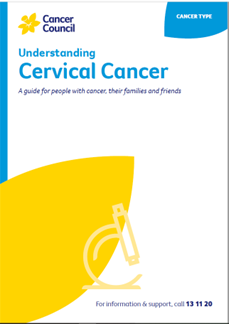- Home
- Cervical cancer
- Treatment
- Radiation Therapy
- Side effects of radiation therapy
Side effects of radiation therapy
Below we discuss the short and long-term effects of radiation therapy.
Learn more about:
Short-term side effects
The side effects you have will vary depending on the dose of radiation and the length of the treatment. Many will be short-term side effects that occur during treatment or within a few weeks of finishing. Side effects can take several weeks to get better.
| fatigue | Your body uses a lot of energy dealing with the effects of radiation on healthy cells. Tiredness usually builds up slowly during the course of the treatment, particularly near the end. It may last for some time after treatment ends. |
| bladder and bowel changes | You may pass urine more often or with more urgency, or feel a burning sensation. Try to drink plenty of water to dilute your urine. Bowel movements may be more frequent, urgent or loose (diarrhoea), or you may pass more wind than normal. Less commonly, there may be some blood in the faeces (poo or stools). Your treatment team will prescribe medicines to reduce these side effects. |
| skin redness, soreness and swelling | Radiation therapy may make the skin in the treatment area dry and itchy. Occasionally, your skin may look red and peel, like sunburn. The treatment team will recommend creams to use to make you more comfortable. |
| hair loss | When radiation therapy is aimed at your pelvic area, you may lose your pubic hair. This hair may grow back after the treatment ends, but it will usually be thinner. The radiation therapy will not cause you to lose hair from your head or other parts of your body. |
| vaginal discharge | Radiation therapy may cause or increase vaginal discharge. Let your treatment team know if it smells different or has blood in it. Do not wash inside the vagina with water or other fluids as this may cause infection. |
Long-term or late effects
Some side effects may continue for longer. Other side effects from radiation therapy may not show up until many months or years after treatment. These are called late effects.
| lymphoedema | Radiation can scar the lymph nodes and vessels and stop them draining lymph fluid properly. This may lead to swelling of the legs or genital area. This can occur months or years after radiation therapy. |
| bladder and bowel changes | Bladder and bowel changes can also be late effects, appearing months or years after radiation therapy finishes. You may pass urine or stools (poo) more often or need to go in a hurry. Sometimes, changing your diet and avoiding spicy and fatty foods can help. Let your doctor know if you have any bleeding or have pain in the abdomen and cannot open your bowels. |
| narrowing of the vagina | The vagina may become drier, shorter and narrower (vaginal stenosis), which may make sex and follow-up pelvic examinations uncomfortable or difficult. Your treatment team will suggest strategies to prevent this, such as using vaginal dilators. |
| menopause | If your ovaries have not been removed, radiation therapy will stop the ovaries producing hormones, which leads to early menopause. Your periods will stop, you will no longer be able to become pregnant and you may have menopause symptoms. |
| pelvic fracture | Rarely, radiation therapy to the pelvic area can weaken bones and cause a fracture. Pelvic fractures are the most common. This may not happen until 2–4 years after treatment. The risk is higher after menopause and if you have low bone density (osteoporosis). |
→ READ MORE: Chemotherapy for cervical cancer
Podcast: Making Treatment Decisions
Listen to more of our podcast for people affected by cancer
More resources
Prof Martin Oehler, Director of Gynaecological Oncology, Royal Adelaide Hospital, and Clinical Professor, University of Adelaide, SA; Dawn Bedwell, 13 11 20 Consultant, Cancer Council QLD; Gemma Busuttil, Radiation Therapist, Crown Princess Mary Cancer Centre, Westmead Hospital, NSW; Dr Antonia Jones, Gynaecological Oncologist, The Royal Women’s Hospital and Mercy Hospital for Women, VIC; Angela Keating, Senior Psychologist, Royal Hospital for Women, NSW; Anne Mellon, Clinical Nurse Consultant – Gynaecological Oncology, Hunter New England Centre for Gynaecological Cancer, NSW; Dr Inger Olesen, Medical Oncologist, Andrew Love Cancer Centre, Barwon Health, Geelong, VIC; Dr Serena Sia, Radiation Oncologist, Fiona Stanley Hospital and King Edward Memorial Hospital, WA; A/Prof Megan Smith, Co-lead, Cervical Cancer and HPV Stream, The Daffodil Centre, Cancer Council NSW and The University of Sydney, NSW; Emily Stevens, Gynaecology Oncology Nurse Coordinator, Southern Adelaide Local Health Network, Flinders Medical Centre, SA; Melissa Whalen, Consumer.
View the Cancer Council NSW editorial policy.
View all publications or call 13 11 20 for free printed copies.

